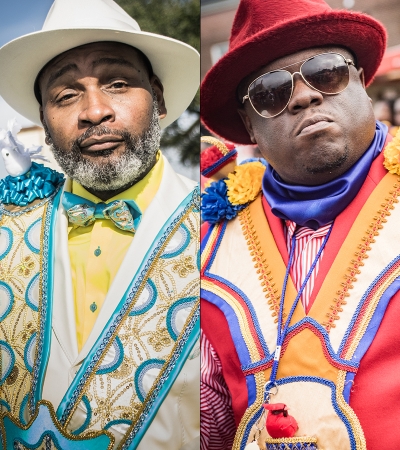Byron: I grew up on the West Bank in New Orleans. Growing up in Algiers, I travelled to this side of the river and saw a couple of parades, but I was standoffish. I saw them pass but did not really understand them.
The bug bit me in 1994 when I was asked to ride as a Duke in the Popular Ladies parade. A friend of mine, Lynette Ladmirault, was the vice president at the time, and my cousin Edmund Collins was their king. The Popular Ladies used to draw this huge crowd, and the first time we came out the door, the amount of people standing out there was like, “Oh, I gotta do this again!”
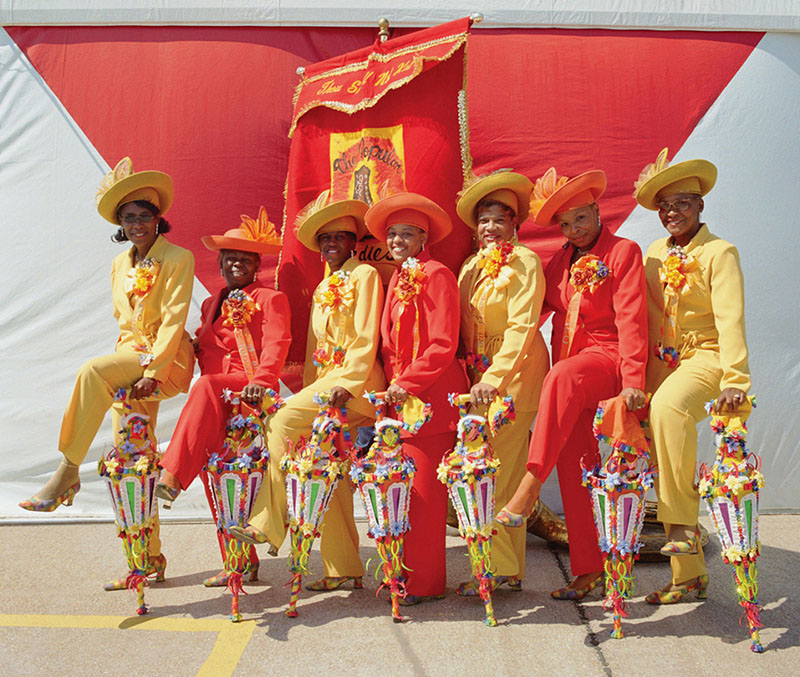
Another good friend of mine, Thomas Franklin, ended up being king after Edmund, so I rode two years in a row. Let me tell you, I had the time of my life: “Oh my God, this is amazing!” I decided I wanted to get more involved and started going to more parades.
Thomas and I are so close he calls my mama mom and I call his mother mom. His stepdad, Robert Jarvis, is family, too. We were at a parade, and I overheard Robert talking about revamping the Dumaine Street Gang. The Dumaine Gang was founded in the Sixth Ward on Dumaine and North Robertson. Robert and them used to meet every day over at Claude’s Grocery Store—hang out and shoot the breeze. They started talking about starting a club and finally somebody was like, “Why do we keep talking about it? Let’s do it!” They first paraded in 1997, and, for whatever reason, they didn’t parade again in ‘98.
At the parade, I told Robert, “Pops, you're bringing the Dumaine Street Gang back? You didn’t talk to me yet.” He went into his wallet and showed me this little card where he had written some names down. He had my name on there, and was like, “Son, I got you.” I remember being so excited like I had just won the Superbowl: “Oh, I'm gonna be part of a club!”
Rene: Like being drafted to the right team.
Byron: When I joined the club in 1999, we had six members: five officers and me. The guys in the club were all from Tremé—they were part of the culture from birth—and I’m from the Westbank. I wasn’t very talkative that first year, but I didn’t miss a meeting, and absorbed everything. We did a lot of communication with Norman Dixon Sr. about the permits. The other clubs that really held our hand were the Popular Ladies and the Sudan. Sudan became our big brothers. If we were looking for ribbon, they told us where to go. When we were clothes shopping, they gave us ideas. And one of their members, Adrian “Coach Teedy” Gaddies, did our decorations.
Rene: They still do our decorations to this day.
Byron: Our first year, we came out the door and it looked like we had about ten people standing out there. I joke with the guys, “We had 10 people out there and seven of them were my brothers and sisters.”
Where everybody at? The day we paraded, the Calliope High Steppers were parading uptown, and they had six divisions. I kept thinking, “Why are we parading the same day as these guys?” They’ve been around for years and we’re brand new.
I found out we were parading that day because one of the guys who was instrumental in starting the club wanted to have the parade on his mother's birthday. After the parade, I made an appeal: “Fellas, we gotta be open about this. If we continue on their day, we will have problems getting a band. All the bands will be uptown.”
I continued, “Why are we fighting for this date when on the first Sunday of the month there's nobody parading?” We agreed to move to the first Sunday. Crowd-wise, it was definitely beneficial. After the second year, I became the president and I've been the president ever since. Our Vice President is Nathaniel “Fat” Jackson. He was born and raised in the Tremé/Dumaine Gang area. He graduated from Andrew J. Bell and Joseph S. Clark. He's the mouth of the downtown; the trash talker.
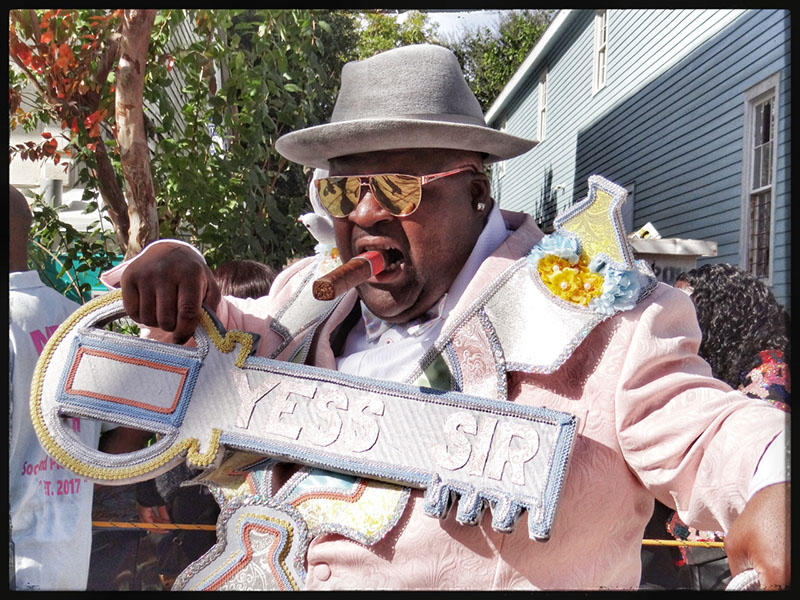
Rene: Instigator.
Byron: He’s the wanna-be-tough guy who, at the end of the day, is a big teddy bear. He will tell you some crazy stories; keep you in stitches.
Rene: He’s one of those people who light up the room. He coaches little league football at St. Roch Park. Those kids are really his passion. Some of the kids go on to play high school and college ball. He has a son who’s playing right now at Mississippi. As beautiful as he looks in nice, expensive clothes, when his kids come back to see him, that’s his glory. That’s why he sticks his chest out. They come to see Coach Fat second line.
Byron: He started his own tradition the year his grandmother died. He designed a key and put her name on it. Every year since, he has carried a key with a different theme.
Rene: The key symbolizes, “Dumaine Street, we so pretty, they gave us the key to the city.”
Mr. Bang Bang
Rene: In the St. Bernard Housing Development, I grew up under the Original Big Seven Social Aid and Pleasure Club, and my uncle, Alton Green, was the chief of a Seventh Ward Indian gang. I remember my family sewing Indian suits and preparing ribbons and flowers all night long. My grandmother, Dorothy Clark, did a lot of cooking. Early on Mardi Gras morning, the spyboys came in the courtyard and shot in the ground or the air to get the big chief.
My father-in-law, Mr. Ronald “Double Trouble” Bullie, owned Bullie’s Place on St. Phillip and North Derbigny in the Sixth Ward. Dumaine Gang used to come over to the bar to socialize. One night, the second line music was on, and Big Will and Byron saw me dance.
Byron: I remember looking at William and he looked at me, and we both had this facial expression like, “I didn’t know he could do that! Okay, we about to get a game plan.”
Rene: They were like, “You need to get dressed. You need to come parade.” I felt the same way that Byron did when he joined. The president of the Big Seven, Ed Buckner, and I still joke about that today. He says, “You need to come home.” I’m like, “Well, I’m home already. I’m Dumaine Gang to the death of me—even through death.”
The year we wore the orange and purple, somebody on the side was saying how bad we was—you know, how good we looked—and I started chanting “Bang Bang, Dumaine Street Gang!” The other club members started following behind, chanting it as well. After the parade was over, they started calling me Mr. Bang Bang.
Over the years, I’ve become an MC. People hire me on for their dances or parties. One of the best rappers in New Orleans, Ricky B, is from the St. Bernard. He brings bounce music to other cities, and I’ve gone with him as his hype man. I come on stage in regular clothes, and do a song or two with him, then I leave out, change into my parade attire, and second line a little bit with the brass band music. Somebody might want me to MC their trolley during a parade with a DJ. I’m your man, Mr. Bang Bang. We’ll have a good time, I guarantee that.
Building a Crowd, Building a Brotherhood
Rene: Throughout the years, the love that people show the Dumaine Street Gang is an amazing feeling. I have watched the crowd grow from 50 people outside the door to literally hundreds of people waiting. Food trucks come at six o'clock in the morning to get their spot. We can walk into a dance, or be out at somebody else's parade, and people want to come hug us, show us love. It makes us feel like neighborhood superstars.
Byron: When you're parading sometimes you don’t really see the crowd. You know it's there, but you don’t know how big it is. You usually hear people talk about it after the parade: “Oh man, it was like Mardi Gras day!”
Rene: When I was king in 2010, I rode on the float at the front of the parade. We were on Esplanade and Rampart, and I looked behind me and could see a sea of people all the way back to Claiborne—on both sides of the street, I might add.
Byron: I had something similar happen when I went up on one of our queen’s float to take a picture with her. I stood there above the crowd, thinking, “Where do all these people know about the Dumaine Street Gang from?” It was overwhelming. For me, it was fulfilling—like I’ve done my job.
Rene: In 2011, everybody's standing outside the Treme Center waiting for us to come out the door.
Byron: But NORD didn’t show up to open the center. We were panicking like, “What are we gonna do?” William Batiste said we could go down the street to Benny’s mama’s house to get dressed. We called the band and told them to meet us over there, and we came up the street to the Treme Center with the band. The people thought that’s the way it was planned!
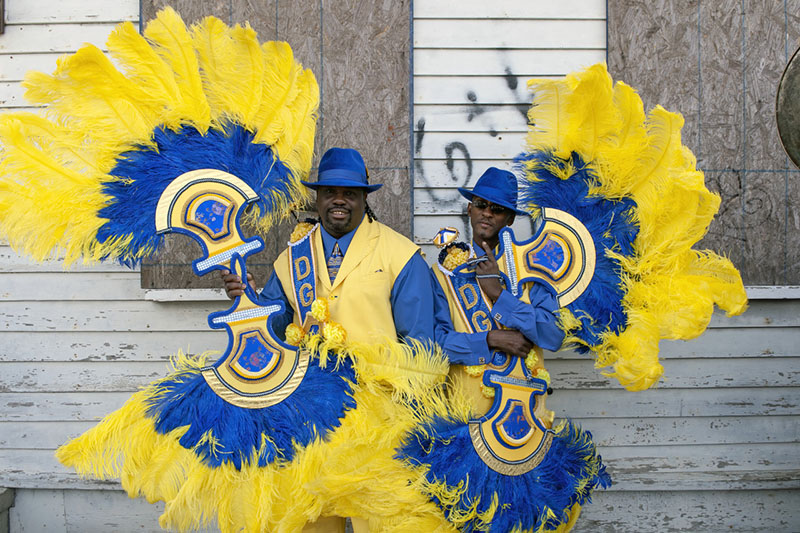
Rene: They were cheering us on! “Oh man, we thought y’all was inside!” That door was locked!
Byron: Over the years, we’ve formed a brotherhood.
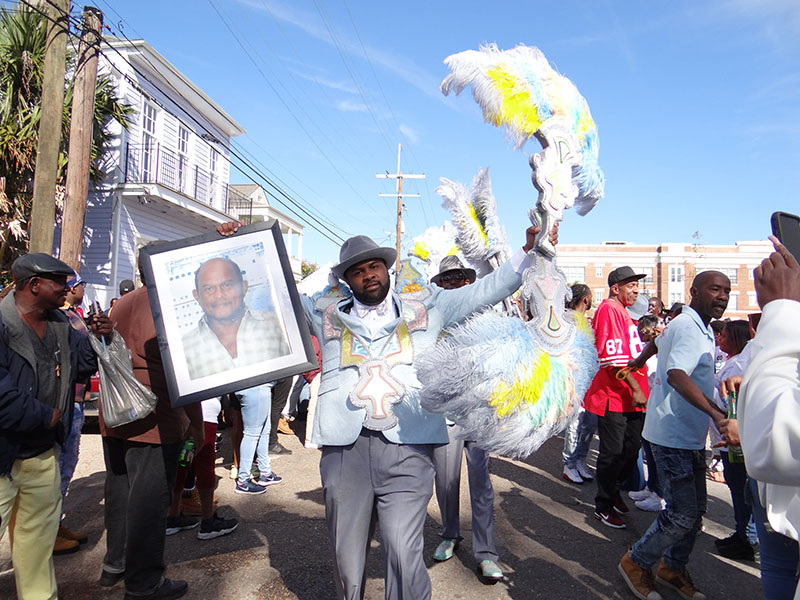
Our wives became friends, our children became friends, our mothers have adopted each one of us. If we found out today that the city decided that there would never be another second line, we still would have that same camaraderie. Through this pandemic, we have still met every week.
Rene: Masks and all.
Byron: Tuesdays 7:30 at Byron’s house. We don’t send a message out and say, “Don’t forget.” Everybody knows it's our Tuesday thing. During Covid, we sat outside, spread the chairs six feet around with the ice chest in the middle. A lot of us wasn’t working. A lot of us was losing loved ones and lost loved ones. Our club was our therapy.
Rene: I haven’t paraded in a few years, and I still go to meetings sometimes to be around my brothers. Even though I’m behind the scenes, I’m still a part of the Dumaine Street Gang. Whatever they’re doing, I’m with it.
Giving Back
Byron: After the Katrina, when we were all moving back to New Orleans, we were in the process of negotiating with the city, trying to get our season started again, and a couple of times when we had meetings, 39 clubs with 39 voices got real crazy, real soon. Mrs. Barbara Lacen started the New Orleans Second Line Task Force so that we could speak as one body. When Tamara Jackson, the president of VIP Ladies and Kids, came back to town, she was elected president and took it from there. Tamara is truly a behind the scenes person and has done a wonderful job. I was the business manager for the first five years and have been vice president ever since. The Task Force is like a guiding light for the culture—letting the clubs know what’s going on with the city, grants, and other programs.
Early on, we were able to negotiate the same permit fees for each club. The Pigeon Town Steppers had been paying double because they paraded on Easter, but the city agreed to charge them the same amount as the rest of us. We also grandfathered in that no matter when Easter Sunday falls, that’s the Pigeon Town Steppers’ day—everybody else will just have to adjust their Sunday around it. I remember the day we voted about it, every club in the room immediately raised their hands. It wasn’t a question—that’s their day.
Rene: Everybody knows Mr. Byron Hogans. He is like the Barack Obama of second line world.
Byron: It goes back to supporting clubs throughout the years. When we started, Popular Ladies and Sudan took us under their wing and supported us. It’s a matter of giving back. Through supporting the culture as a whole, we have developed some wonderful relationships with other clubs. It really shows when it's our week to parade, the way the phones start ringing. “Hey, it’s Tyrone from Family Ties. B, y’all ready? You need us to do anything?” Ole & Nu Style: “Y’all ready? How the decorations coming, you need some help?” That’s how we were raised in the second line game, so we try to pass it on. One of our ways of giving back, to help different clubs out, is to give stops.
Rene: We do up to 15 parades a year.
Byron: The downtown clubs, we don’t even call and ask each other for a stop. We just have that kind of camaraderie with each other. When clubs like Sudan, Family Ties, Ole & Nu Style, Black Men of Labor are organizing their parades, they just send their route sheet and say, “Here, this is where y’all stop at.” We also give stops uptown.
Rene: Four or five times a year, uptown. We don’t just give stops where pass out drinks and food. Sometimes we help clubs change clothes.
Byron: Especially when a club’s got a children's division.
Rene: It’s tough to deal with those children on parade day. They be hot, some of them be tired. We wipe them off, so they won’t be sticky when we put on the fresh clothes.
Byron: By us giving so many stops, a lot of clubs host stops for us.
Rene: They get out the red carpet for us.
Byron: After we come out of the Treme Center on North Villere, we right turn on Dumaine, and when we get to Dumaine and North Robertson we pause right there and pay tribute to our fallen members and our founders.
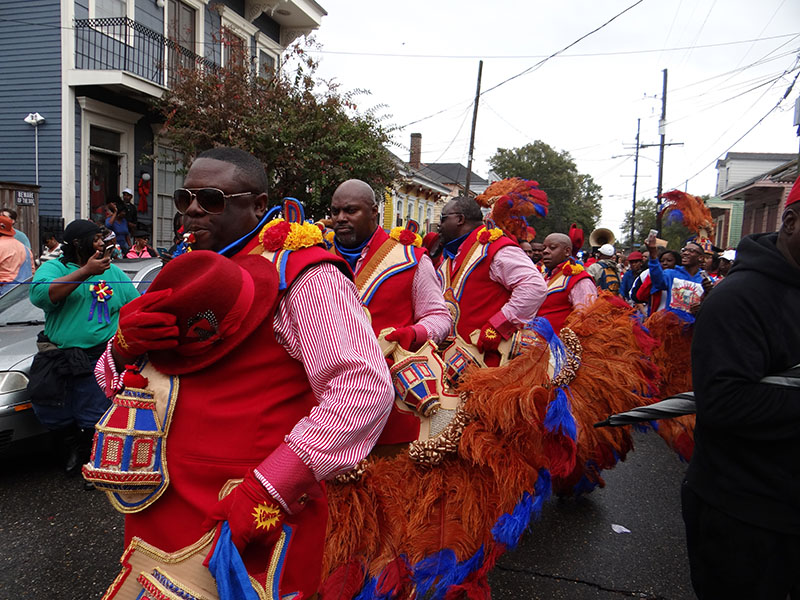
We continue up Dumaine to North Claiborne, left on Claiborne, over to Orleans, right on Orleans. Our next stop is the Ole & Nu Style right there at the Carver Theater. We continue on Orleans to North Broad. We make a right on Broad where we have a stop at one of our club members, Willie “Chill Will” Pierce’s barber shop, Impressions. We continue to Esplanade, make a right on Esplanade back down to Claiborne where Nine Times hosts a stop under the bridge. On St. Bernard, we stop at the Autocrat before we go over to Seal’s Class Act. As we do the U-turn to come back, that’s where we lose control of our crowd because it’s so massive. The police are trying to get us through so it’s kind of hard to have another stop.
Rene: Once we leave Seal’s Class Act, the parade not over, but some people end there, lining up to send us off back to the Treme Center. As we get to the end, we ask the king and queen’s courts, the big shot, and everyone else who is riding in the parade to get off the trolleys and floats.
Byron: We all walk in together.
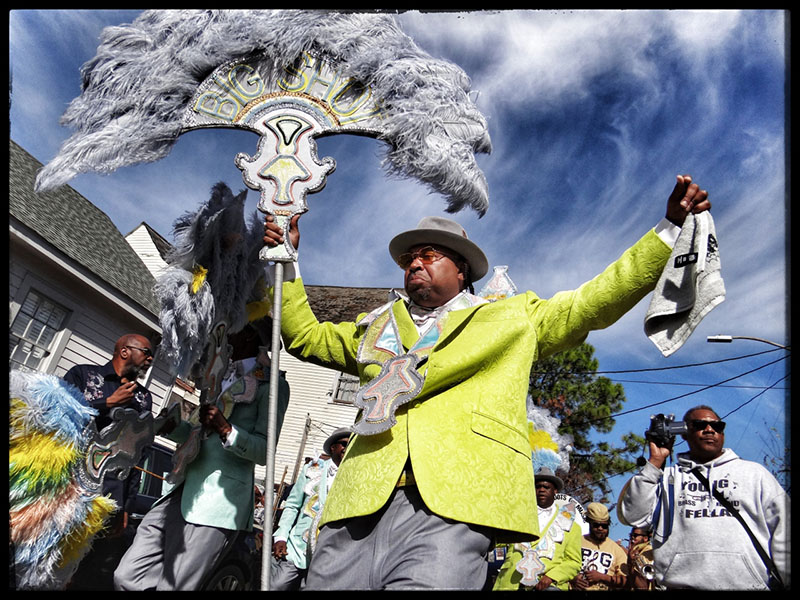
Renee: That’s a rush. The crowd has you amped up, the pace picks back up a bit, and the band plays something like “Let's Go Get Em.” If you stop, you’re going to get trampled. We move so fast it feels like your feet aren’t touching the ground.
Byron: One of club members, Oscar Jackson, owns the bar Hank’s so we usually have an after party there, and then go by Seal’s for a little while to show her some love after giving us a stop.
We have a special place in our hearts for Nine Times because our clubs started at the same time. We were both babies, holding each other's hand. When their club started to have some difficulties, we didn’t want to see them split. We tried to help mend their differences. When that didn’t work out, we said to Troy Materre and them, “Y’all can just come with us.” They formed the ? Marks as a division of the Dumaine Street Gang. We never want anyone to feel like we were taking sides because our clubs were raised together.
Over the years, our family has truly expanded with the additions of One More Time who paraded with the Money Wasters for years. The Young Rollers joined a few years later. Markeith Tero was a founder with Distinguished Gentlemen, the men’s division of the Popular Ladies. He wanted to do something with the kids, and we welcomed them in.
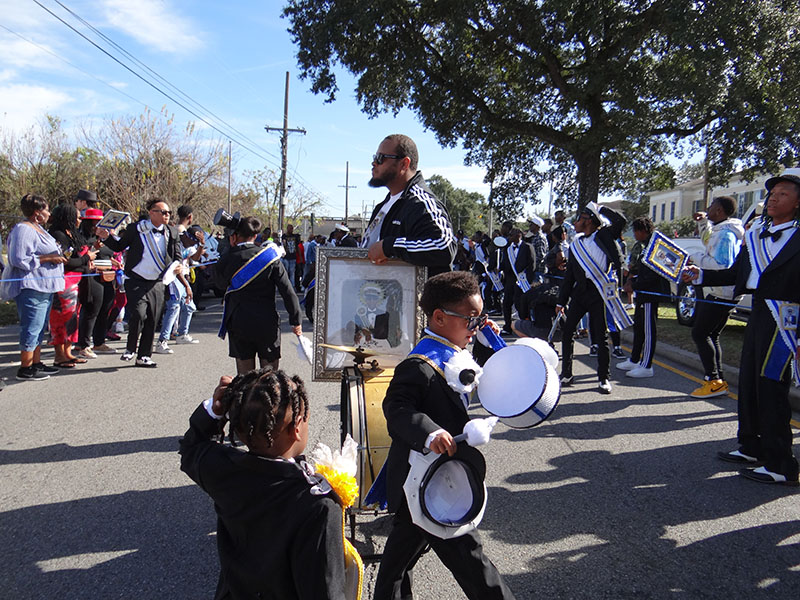
For us, our Sunday has truly become our holiday. It's our Thanksgiving. It's our Christmas. The four hours you parade is a culmination of all of our sweat and tears, the fish plates and raffle tickets we sold, to make the day.

